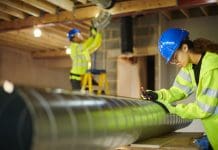Matt Evans, chief operating officer at TopHat, tells us why National Apprenticeship Week is the key to the success of MMC
The UK house building sector faces a serious skills shortage. Figures from the Office of National Statistics show that over 20% of UK-born workers in the house building sector are aged 55 or over, meaning a significant percentage of the sector are nearing the age for retirement.
The UK has an ageing population and this is reflected in the workforce, where in the house building sector over-60s significantly outnumber those under 30. This has been compounded by the fallout of Brexit, and the decrease in economic migrants coming to the UK from the EU. Whereas just under half of those working in the house building sector who are born in the UK are aged 45 and over, whereas just 18% of non-UK nationals are in this demographic.
Put simply, there just aren’t enough young people entering the house building sector and a huge amount of knowledge and vital skills are about to be lost as fewer young professionals are replacing the outgoing generation.
UK employers must start taking on more apprentices as a way to ease the skills shortfalls in key industries. Increasing education for people to upskill is important in any sector. If the sector is to reach the Government’s targets of delivering 300,000 new homes annually, then having a skilled and domestic workforce should be a long-term priority.
Apprenticeship schemes in MMC
Young people just don’t find traditional brick and mortar construction as appealing as it once was. They want high-tech modern innovation that is sustainable and reflects the society they live in, working for their generation, not against them.
The best way to upskill young people into ageing industries is through apprenticeships. Since the Government started its National Apprenticeship scheme 15 years ago, over 5 million people have been upskilled into industries with difficult barriers to entry.
This year’s theme for National Apprenticeship Week (NAW) is ‘build for the future’, encouraging over 500,000 people of any age to reach their career goals by building skills and experience through apprenticeships.
From delivering care as key workers across the NHS, to working in construction to tackle the country’s housing crisis, apprentices are at the root of the Government’s levelling up plans, and building economies for the future.
Apprenticeship schemes provide a route into skilled employment and education for those from disadvantaged communities and demographics, and provide the key to increasing representation from women and minority ethnic demographics, particularly in house building.
House building needs new blood, and modular house builders like TopHat are leading the way in expanding and diversifying the role of apprenticeships across the industry. Young people care about sustainability and disrupting industries stuck in old ways.
As industry innovators, apprentices are attracted to MMC companies, especially those with sustainability at their core, using precision engineered timber frames and reducing the operational and embodied carbon of the built environment one home at a time.
TopHat currently has 22 apprentices working across manufacturing, health and safety, finance, and are looking to grow this to 10% of the business over the next three years, keeping the next generation at the heart of the housebuilding industry. By supporting the National Apprenticeship scheme, TopHat is available to hire high-quality apprentices and support them throughout their education and career development.
Championing sustainable innovation in regional areas and providing transferable skills through green jobs is enfranchising young people in the regions to be at the forefront of the green industrial revolution. If MMC is to remain at the salient of levelling up the UK through green innovation, then apprenticeships are essential to leading the way.













